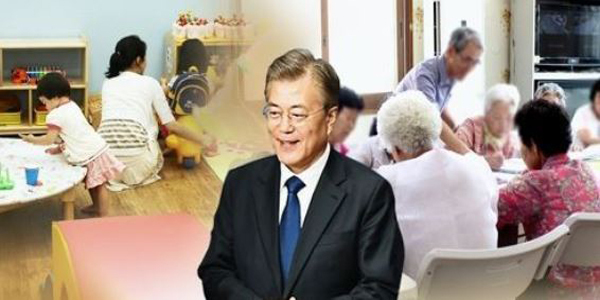Tax-to-GDP ratio needs to top 35% by 2060 to meet growing welfare programs: report
By YonhapPublished : Sept. 6, 2017 - 16:37
South Korea's tax-to-GDP ratio needs to surpass the 35 percent mark by 2060 to meet the government's social welfare-related spending plan, a local think tank said Wednesday.
The report by the Korea Economic Research Institute comes as the ruling Democratic Party proposed hiking up tax rates for the super-rich and top-earning conglomerates to help finance the Moon Jae-in administration's welfare and job creation agenda estimated to cost 178 trillion won ($156 billion) over the next five years.
It said the 35 percent tax burden ratio is needed to keep national debt under control while satisfying welfare-related outlays.
The government and the ruling party plan to raise the income tax rate for individuals earning between 300 million won ($267,737) and 500 million annually to 40 percent from the current 38 percent and the rate for individuals earning more than 500 million won to 42 percent from the current 40 percent. The party is also pushing to mark up the corporate tax rate for firms with annual net profits exceeding 200 billion won to 25 percent from the current 22 percent.
The report by the Korea Economic Research Institute comes as the ruling Democratic Party proposed hiking up tax rates for the super-rich and top-earning conglomerates to help finance the Moon Jae-in administration's welfare and job creation agenda estimated to cost 178 trillion won ($156 billion) over the next five years.
It said the 35 percent tax burden ratio is needed to keep national debt under control while satisfying welfare-related outlays.
The government and the ruling party plan to raise the income tax rate for individuals earning between 300 million won ($267,737) and 500 million annually to 40 percent from the current 38 percent and the rate for individuals earning more than 500 million won to 42 percent from the current 40 percent. The party is also pushing to mark up the corporate tax rate for firms with annual net profits exceeding 200 billion won to 25 percent from the current 22 percent.

The National Assembly Budget Office has estimated South Korea's tax-to-GDP ratio will reach an all-time high of 19.7 percent in 2018 from 19.4 percent last year.
The proportion of welfare expenditures to GDP is expected to surge to 33.7 percent in 2060 from 13.1 percent in 2020, 20.4 percent in 2030 and 31.4 percent in 2050, the KERI report said. The rise reflects the growing number of elderly and other recipients of various welfare programs and expected changes in the taxpayers' income levels.
The think tank then said with the current pace of welfare spending, South Korea will top the list of countries with this type of spending by 2040.
The report recommended the government learn from other economies that faced fiscal crises while increasing welfare spending beyond what the state brought in.
"That's why we need to a greater more focus on reducing unnecessary welfare expenditures rather than on raising tax revenues," KERI said.
It then pointed out that South Korea's income redistribution rate is lower than that of Britain despite South Korea's higher income tax rates.
"That's because the size of South Korea's tax revenues base is smaller with the proportion of people actually paying taxes standing at 52 percent compared to Britain's 90 percent," it said. (Yonhap)






![[KH Explains] How should Korea adjust its trade defenses against Chinese EVs?](http://res.heraldm.com/phpwas/restmb_idxmake.php?idx=644&simg=/content/image/2024/04/15/20240415050562_0.jpg&u=20240415144419)












![[Today’s K-pop] Stray Kids to return soon: report](http://res.heraldm.com/phpwas/restmb_idxmake.php?idx=642&simg=/content/image/2024/04/16/20240416050713_0.jpg&u=)